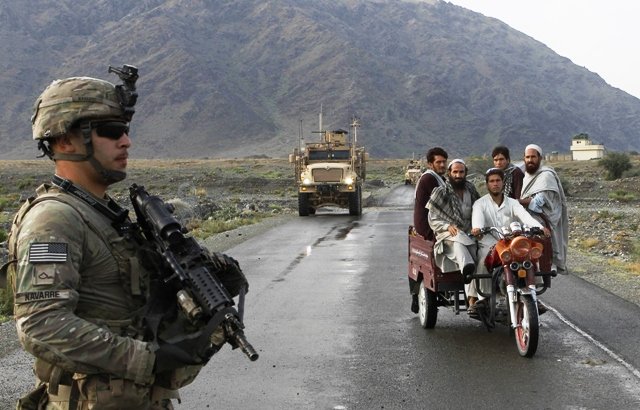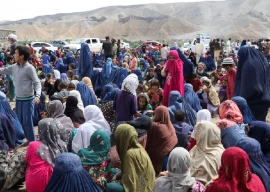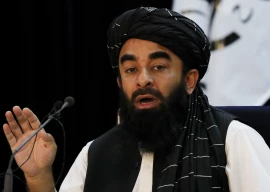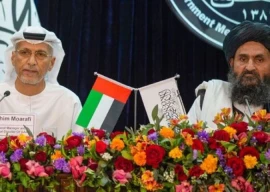
The families of thousands of Afghans killed in the US' 20-year military intervention in the country are now seeking justice for their deceased loved ones.
The 2001 invasion of Afghanistan by US-led coalition forces, launched on the grounds that the ruling Taliban administration harbored the late leader of Al-Qaeda, Osama bin Laden, ended in the withdrawal of foreign troops on the night of Aug. 30, 2021.
More than 47,000 civilians lost their lives in the ensuing operations during those two decades under the guise of the US' "war on terror," while the number of Afghans who died while working for the US has reached 3,846.
Over 2,400 US soldiers were also killed.
Read more: The US War in Afghanistan: A visual timeline
Though Washington was able end its longest war by withdrawing its troops, the suffering of Afghan families who lost their children, fathers, mothers, and relatives, lingers.
Grieving father demands investigation
Having lost his three sons in night operations carried out in 2018 by US soldiers in the eastern village of Vutapur in Kunar province, grieving father Mohammad Ekrem Khan told Anadolu Agency that his pain is still fresh.
"I couldn't even attend the funeral of my young children because the roads were not safe, and that hurts me even more," said Khan, who was in the capital Kabul during the US troops' so-called operation that killed his sons Abidullah, 12, Abdul Kahhar, 20, and Abu Zer, 26, in front of their mother.
His pain still vivid, Khan demands an investigation into their deaths and punishment for the perpetrators, asserting that his sons had no connection with terrorists.
Recounting their final night together, mother Zeynep Khan said: "After my children had dinner, they went to their rooms to sleep. A few minutes later, US helicopters landed in the village. I couldn't understand what happened."
"Shortly after, US soldiers climbed the wall and raided our house, breaking in the door."
She went on to say that the troops "shot dead three of my sons in front of my eyes, and tortured and took another of my sons with them."
Mother Khan said she is still unable to forget that moment, even after so many years, adding that life had become meaningless after her sons' death.
'All joy of living taken away from me'
Zabanya Khan, the wife of the oldest son Abu Zer, said US troops killed her husband in front of her, too, adding she has been struggling with mental health problems since then.
"With the murder of my husband, all joy of living was taken away from me. I can't be happy anymore. I try to make a living working on farms. What I think about the most is the future of my children," she said.
'Now, I want justice'
Yusuf Khan, whose three brothers were killed by US soldiers, said he was also severely beaten.
"After the US soldiers killed my three brothers, they tortured me and took me to Bagram Airfield. I was held there for 18 days and tortured in the prison on this base."
He went on: "I couldn't even attend my brothers' funeral. On the 19th day, they released me without saying anything. Now, I want justice."
Yusuf also demanded that atrocities committed by the US in Afghanistan be brought to light, arguing that thousands of similar incidents had taken place across Afghanistan.
US must pay compensation
One of the Khan's fellow villagers, Zubeyde Safi, who lost her 40-year-old husband in a 2015 US drone strike, tearfully expressed her grief.
"Right after the attack, a neighbour said that the field where my husband worked had been bombed. I ran to the field and came across my husband's body, laying in pieces. That moment haunts me," she said.
Safi is currently struggling to make ends meet with her two daughters, aged 15 and 17. She said her husband was innocent and she wanted the perpetrators punished after an investigation.
The US must pay compensation for the murders committed during Afghanistan’s invasion, she said.
In just a few years after it was overthrown in 2001, the Taliban began regrouping, particularly in southern areas with high Pashtun populations.
They started to gain territory, especially in rural areas, by launching attacks against NATO forces and the Afghan army.
NATO forces fought on the ground against the Taliban until 2014, when they handed the fight against the Taliban over to Afghanistan's fledgling army.
However, it suffered serious losses in its clashes against the Taliban.
Civilian casualties, particularly in air strikes and night raids by NATO forces, caused outrage among local residents.
The Taliban returned to power in Afghanistan last year as officials of the US-backed Kabul administration fled the country and foreign forces withdrew.


1719660634-1/BeFunky-collage-nicole-(1)1719660634-1-165x106.webp)

1732276540-0/kim-(10)1732276540-0-165x106.webp)


1732273396-0/Copy-of-Untitled-(72)1732273396-0-270x192.webp)
1732269802-0/Copy-of-Untitled-(71)1732269802-0-270x192.webp)
1732261957-1/Copy-of-Untitled-(66)1732261957-1-270x192.webp)










COMMENTS
Comments are moderated and generally will be posted if they are on-topic and not abusive.
For more information, please see our Comments FAQ